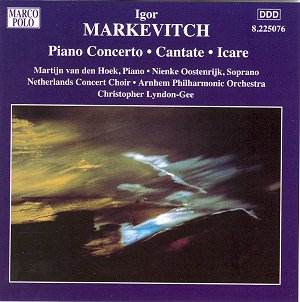I wrote
about the first three volumes in
this Markevitch series back in 1999
and then, to my shame, rather lost sight
of it. I now return at volume 6 - I
will certainly request volumes 4 and
5 and review those as well when I can.
Markevitch, rightly
renowned as a conductor whose inspirational
dramatic inclination raged through the
romantic repertoire was also a composer.
Indeed he was a composer long before
he was a conductor. The concerto and
cantata on this disc are works of his
teens when his creativity was moulded
to the Stravinskian curve. The Concerto
is tightly and insistently rhythmic
in the indefatigable outer movement
- very neo-classical. The central movement
is a powerful andante in which
world-weary uncertainty comes up against
power-lofted tragedy which takes something
from the portents and tension of The
Rite of Spring. The Cantate
is in four movements and sets a text
by Cocteau. The massed choral work is
provided by a male voice choir with
Nienke Oostenrijk. The singing conspires
with the orchestra in providing the
constantly and quickly moving forward
impetus. The style reminds me of early
into mid-period Tippett, not dissonant,
rippling with testosterone, full of
gravelly buoyant speed - a touch of
Orff perhaps or the Stravinsky Symphony
of Psalms. The piece ends in the
chaste glow of the soprano's singing.
Fifteen years on and
this Icare in seven movements
is a quite different work. It also differs
from the dour original version of 1932
- recorded on Marco Polo 8.223666. Here
Markevitch is determinedly modernistic
with a plethora of percussion punctuation
- an incessant counterpoint to the free-flowing
melodic lines that rise in languid dawns.
The final section Mort d'Icare fades
magically into a niente then
rises hesitantly grumbling before grasping
one of those mellow glowing diminuendi.
No wonder Bernstein rated this music
so highly.
The words are sung
in French in which language they are
printed in the booklet alongside an
idiomatic English translation by conductor,
notewriter and guiding intelligence
behind the whole project, Christopher
Lyndon-Gee. I sense a labour of love
here and his artistic choices seem to
me to be unerring.
Markevitch as a composer
was no late romantic. His muse tends
to neo-classicism, Stravinsky, Roussel
(though less clamant) and Mossolov.
Rob Barnett
